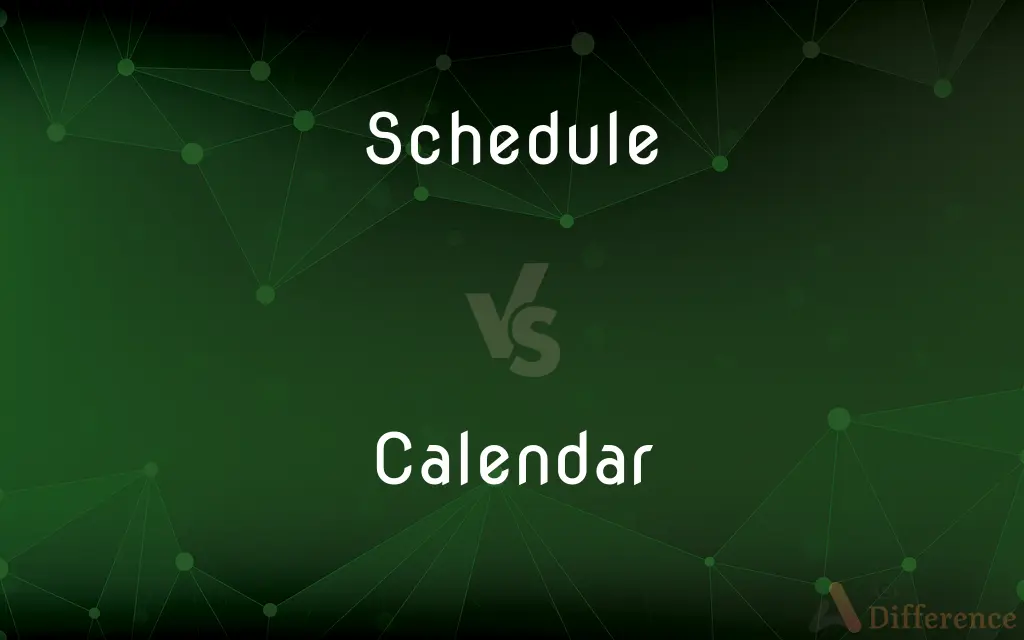Schedule vs. Calendar — What's the Difference?
By Tayyaba Rehman & Maham Liaqat — Updated on March 8, 2024
A schedule details tasks or events at specific times, focusing on timing and sequence, whereas a calendar displays dates and events across a month or year, emphasizing an overview of time.

Difference Between Schedule and Calendar
Table of Contents
ADVERTISEMENT
Key Differences
A schedule is a tool used for planning out specific tasks or events at set times, aimed at organizing an individual's or group's responsibilities and activities. It often includes hours, locations, and detailed information about the task. On the other hand, a calendar provides a broader view, marking days for various events, holidays, and appointments without necessarily specifying the time or sequence of activities.
Schedules are typically more dynamic, changing based on tasks, priorities, and given time. They are used to manage time efficiently on a daily or weekly basis, focusing on short-term time management. Calendars, whereas, offer a static view of months or years, allowing individuals to mark significant dates or events, aiding in long-term planning.
While schedules are detailed and task-oriented, highlighting the sequence and timing of activities, calendars are more about date orientation, showing when something happens rather than the details of the activity. This distinction makes schedules more suited for precise time management, while calendars are better for date tracking.
Schedules often cater to professional or academic settings, where detailed planning and time allocation are crucial for meeting objectives and final-time. In contrast, calendars are widely used in both professional and personal contexts, serving as a basic tool for noting important dates like birthdays, holidays, and anniversaries.
Despite their differences, both schedules and calendars are essential tools for time management, each serving unique purposes. Schedules provide a roadmap for completing tasks efficiently, whereas calendars offer a bird's-eye view of time, helping with long-term planning and date recollection.
ADVERTISEMENT
Comparison Chart
Focus
Timing and sequence of tasks
Overview of days and events
Usage
Short-term planning
Long-term planning
Detail Level
High, with specifics of tasks
Lower, with date-specific events
Changeability
Dynamic, often updated
Static, less frequently updated
Context
Professional, academic
Both personal and professional
Compare with Definitions
Schedule
A list showing times at which events are intended to occur.
According to the bus schedule, the next one arrives in 10 minutes.
Calendar
A chart or series of pages showing days, weeks, and months of a particular year.
I marked my vacation dates on the wall calendar.
Schedule
A detailed plan for a project.
The construction schedule is tight but manageable.
Calendar
An arrangement of text or figures showing dates, days, and months, sometimes with information.
The company calendar includes all national holidays.
Schedule
A work plan for employees.
The manager posted the work schedule for next week.
Calendar
A tool used in various fields to plan or schedule events.
The academic calendar outlines the school year.
Schedule
A timetable used in an educational setting.
Her class schedule is packed with science courses this semester.
Calendar
A system for organizing days for social, religious, commercial, or administrative purposes.
The Gregorian calendar is used worldwide for civil purposes.
Schedule
A plan for carrying out a process or procedure, listing sequence of actions.
The conference schedule lists all the speakers and their talk times.
Calendar
A digital or physical tool for tracking dates and events.
I keep all my appointments in my phone's calendar.
Schedule
A schedule or a timetable, as a basic time-management tool, consists of a list of times at which possible tasks, events, or actions are intended to take place, or of a sequence of events in the chronological order in which such things are intended to take place. The process of creating a schedule — deciding how to order these tasks and how to commit resources between the variety of possible tasks — is called scheduling, and a person responsible for making a particular schedule may be called a scheduler.
Calendar
A calendar is a system of organizing days. This is done by giving names to periods of time, typically days, weeks, months and years.
Schedule
A plan for carrying out a process or procedure, giving lists of intended events and times
We have drawn up an engineering schedule
Calendar
Any of various systems of reckoning time in which the beginning, length, and divisions of a year are defined, sometimes along with multiyear cycles.
Schedule
An appendix to a formal document or statute, especially as a list, table, or inventory
They need a clear schedule of fixtures and fittings
Calendar
A table showing the months, weeks, and days in at least one specific year.
Schedule
(with reference to the British system of income tax) any of the forms (named ‘A’, ‘B’, etc.) issued for completion and relating to the various classes into which taxable income is divided.
Calendar
A schedule of events.
Schedule
Arrange or plan (an event) to take place at a particular time
The release of the single is scheduled for April
Calendar
An ordered list of matters to be considered:the bills on a legislative calendar.
Schedule
Include (a building or site) in a list for legal preservation or protection
Cowley Bridge has already been scheduled and protected as an ancient monument
Calendar
Chiefly British A catalog of a university.
Schedule
A list of times of departures and arrivals; a timetable
A bus schedule.
A schedule of guided tours.
Calendar
To enter in a calendar; schedule.
Schedule
A plan for performing work or achieving an objective, specifying the order and allotted time for each part
Finished the project on schedule.
Calendar
Any system by which time is divided into days, weeks, months, and years.
The three principal calendars are the Gregorian, Jewish, and Islamic calendars.
Schedule
A printed or written list of items in tabular form
A schedule of postal rates.
Calendar
A means to determine the date consisting of a document containing dates and other temporal information.
Write his birthday on the calendar hanging on the wall.
Schedule
A program of events or appointments expected in a given time
Can you fit me into your schedule Tuesday afternoon?.
Calendar
A list of planned events.
The club has a busy calendar this year.
Schedule
A student's program of classes.
Calendar
An orderly list or enumeration of persons, things, or events; a schedule.
A calendar of bills presented in a legislative assembly;
A calendar of causes arranged for trial in court
Schedule
A supplemental statement of details appended to a document.
Calendar
(US) An appointment book (US), appointment diary (UK)
Schedule
A federally regulated list of controlled substances, ranked in classes by potential for abuse.
Calendar
(legal) To set a date for a proceeding in court, usually done by a judge at a calendar call.
The judge agreed to calendar a hearing for pretrial motions for the week of May 15, but did not agree to calendar the trial itself on a specific date.
Schedule
One of the ranks or classes in such a list.
Calendar
To enter or write in a calendar; to register.
Schedule
To enter on a schedule
Calculate and schedule each tax deduction on the proper form.
Calendar
An orderly arrangement of the division of time, adapted to the purposes of civil life, as years, months, weeks, and days; also, a register of the year with its divisions; an almanac.
Schedule
To make up a schedule for
I haven't scheduled the coming week yet.
Calendar
A tabular statement of the dates of feasts, offices, saints' days, etc., esp. of those which are liable to change yearly according to the varying date of Easter.
Schedule
To plan or appoint for a certain time or date
Scheduled a trip in June.
Was scheduled to arrive Monday.
Calendar
An orderly list or enumeration of persons, things, or events; a schedule; as, a calendar of state papers; a calendar of bills presented in a legislative assembly; a calendar of causes arranged for trial in court; a calendar of a college or an academy.
Schedule
To list or rank (a controlled substance) in a schedule.
Calendar
To enter or write in a calendar; to register.
Schedule
(obsolete) A slip of paper; a short note.
Calendar
A system of timekeeping that defines the beginning and length and divisions of the year
Schedule
(legal) A written or printed table of information, often forming an annex or appendix to a statute or other regulatory instrument, or to a legal contract.
Schedule of tribes
Calendar
A list or register of events (appointments or social events or court cases etc);
I have you on my calendar for next Monday
Schedule
One of the five divisions into which controlled substances are classified, or the restrictions denoted by such classification.
A Schedule I drug with a high potential for abuse
Calendar
A tabular array of the days (usually for one year)
Schedule
A serial record of items, systematically arranged.
Calendar
Enter into a calendar
Schedule
A procedural plan, usually but not necessarily tabular in nature, indicating a sequence of operations and the planned times at which those operations are to occur.
Stick to the schedule
We're running behind schedule
Things are happening ahead of schedule
Schedule
(computer science) An allocation or ordering of a set of tasks on one or several resources.
Schedule
To create a time-schedule.
Schedule
To plan an activity at a specific date or time in the future.
I'll schedule you for three-o'clock then.
The next elections are scheduled on the twentieth of November.
Schedule
To add a name to the list of people who are participating in something.
I am scheduled for classes next month.
Schedule
To admit (a person) to hospital as an involuntary patient under a schedule of the applicable mental health law.
Whether or not to schedule a patient
Schedule
(US) To classify as a controlled substance.
Schedule
A written or printed scroll or sheet of paper; a document; especially, a formal list or inventory; a list or catalogue annexed to a larger document, as to a will, a lease, a statute, etc.
Schedule
To form into, or place in, a schedule.
Schedule
A temporally organized plan for matters to be attended to
Schedule
An ordered list of times at which things are planned to occur
Schedule
Plan for an activity or event;
I've scheduled a concert next week
Schedule
Make a schedule; plan the time and place for events;
I scheduled an exam for this afternoon
Common Curiosities
Can schedules and calendars be used together?
Yes, they often complement each other in planning and time management, with schedules offering detailed time planning and calendars providing an overview of dates.
What is a calendar?
A calendar is a system or tool for organizing days for various purposes, typically showing days, weeks, and months, along with associated events.
How do schedules and calendars differ in usage?
Schedules are used for short-term, detailed planning of tasks and events, while calendars are used for long-term planning and tracking important dates.
Are there different types of calendars?
Yes, there are several types of calendars, including Gregorian, lunar, and academic calendars, each designed for specific uses and cultural contexts.
What is a schedule?
A schedule is a detailed plan that specifies times at which certain tasks or events should occur.
Why use a calendar?
Calendars help keep track of important dates, events, and appointments, aiding in long-term planning and organization.
Can calendars be digital or physical?
Calendars can be both digital (e.g., smartphone apps, online calendars) and physical (e.g., wall calendars, desk planners).
Is a schedule more detailed than a calendar?
Yes, schedules typically include specific times and details about tasks or events, whereas calendars provide a broader overview of dates and events.
What makes a good schedule?
A good schedule is clear, realistic, flexible, and includes all necessary details for completing tasks efficiently.
How often should a schedule be updated?
A schedule should be updated as often as necessary to reflect changes in tasks, priorities, or time allocations.
Do schedules apply to specific fields?
While schedules are particularly useful in professional and academic settings, they can be applied to any area requiring detailed time management.
How does a calendar assist in personal planning?
A calendar assists in personal planning by providing a visual overview of upcoming events, appointments, and significant dates, facilitating better time allocation.
What's the significance of updating a calendar?
Updating a calendar ensures that it accurately reflects upcoming events, holidays, and appointments, helping to avoid conflicts and missed commitments.
Share Your Discovery

Previous Comparison
Ritual vs. Tradition
Next Comparison
Desolate vs. DesertAuthor Spotlight
Written by
Tayyaba RehmanTayyaba Rehman is a distinguished writer, currently serving as a primary contributor to askdifference.com. As a researcher in semantics and etymology, Tayyaba's passion for the complexity of languages and their distinctions has found a perfect home on the platform. Tayyaba delves into the intricacies of language, distinguishing between commonly confused words and phrases, thereby providing clarity for readers worldwide.
Co-written by
Maham Liaqat













































